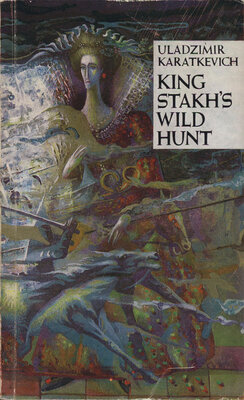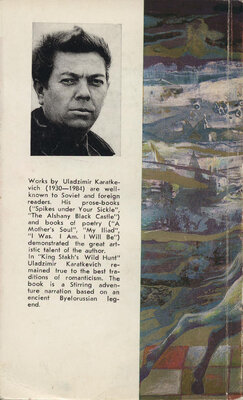King Stakh's Wild Hunt
Уладзімір Караткевіч
Выдавец: Мастацкая літаратура
Памер: 248с.
Мінск 1989
At that very moment I instinctively, not yet comprehending what was wrong, turned back. I had crept rather far away when I heard footsteps. Two persons were walking there. I was under a large weeping-willow. I got up on my feet (the men would not notice me as I had merged with the willow) and, pulling myself up with my hands, climbed into the tree and hid among its branches like an enormous tree-frog.
Two phantoms came up to the murdered man. The moon was shining directly on them, but their faces were hidden behind pieces of dark cloth. Strange figures they made: in very old-fashioned boots and coats, with long hair over which there was some kind of a head gear made of woven strips of leather such as could have been seen in the Vilna museum. On their shoulders they wore long capes. They came up to the corpse and bent down over it. Frangments of their talk reached me:
“Both fell for one and the same bait... Likol... Ha, ha! How they believed this childish nick
name. Both that brave young one and this pig. Likol... Likol’s paid them.”
And suddenly one of them exclaimed in surprise:
“Look, Patzook, this isn’t him!”
“What do you mean, not him?”
“I am telling you that it’s not him. This... this is that queer fish, the manager of Yanowskaya’s estate.”
“Oh! What the devil do you mean?.. Oh well, a trifling mistake.”
“For this mistake, boy,” said the second one darkly, “Likol will have our heads off. It’s bad, brother. Two men dead — horrible! The authorities might become interested in this.”
“But why did he appear instead of the other one?”
The second man did not answer. They left the corpse under the tree in which I was sitting. Had I wished it, I could have let my feet down and stood on the head of each one of them, as I chose, or else, I could have shot twice from my revolver. At such a distance a child would have hit the mark. I shook with excitement, but the voice of cold reason told me that I must not do that — I would frighten away the rest. To put an end to the Hunt, one must do it with one blow! I had, as it was, already committed too many blunders, and should yet, in addition, Nadzeya Yanowskaya perish — then the only thing left for me to do would be to go to the Giant’s Gap, jump into it, and hear overhead the wild roar of the air escaping from out of the swamp.
“Why does he hate this Belaretzky so?” asked the one called Patzook.
“I think because Belaretzky wants to marry Yanowskaya. And then the castle will slip out of Likol’s hands.”
“What does he need it for anyway? It’s only a mouldering coffin, not a castle.”
“Come, don’t say that. It’s of no use to the Yanowky’s, it is a family estate, but for an outsider it has great value. And he is, in addition, in love with antiquity, in his sleep he dreams he is the owner of a tremendous castle, a castle like his ancestors had.”
They stooped talking, then a light flashed and curls of tobacco smoke began creeping up to me. It was already clear to me that aristocrats were standing there. Their crude local speech that had become coarse because of its Polish origin, cut my ear. The voices seemed familiar to me.
“It seems,” growled Patzook after a lengthy silence, “that there is yet one more reason: the serfs.”
“Right you are. And if we kill this one, too, they’ll quiet down, like mice under a broom. For they’ve become too impudent. The recent uprising, the murder of Garaboorda’s steward. Looks impudent. And they became particularly bold after the arrival of Svetilovich. He lived here, the skunk, one month, but had done more harm than a fire. Four serfs torn out of the hands of the court, they handed in a complaint against two aristocrats. And since this Belaretzky has appeared here, there’s been no living at all. Sits in the serf’s huts, writes down foolish stories. Well, no matter, they’ll grow quiet, the boors will, if we also strangle this betrayer of the gentry... Only we’ll have to find out who is the leader of these brazen fellows. I’ll not forgive him my burnt haystacks.”
“And I think that I know who it is. It’s Rygor, the Kulsha’s watchman. What an ugly mug, like a wolf’s. He has no respect for anybody.”
“Never mind, he’ll belch too.”
Again they were silent. Then one said:
“But you know, I’m sorry for Yanowskaya. To drive such a woman to madness or to kill her — a stupid thing. Formerly, people kissed the feet of such a woman. You remember, don’t you how she danced at the ball in a very oldfashioned dress, floating along like a swan?”
“Yes, and our gentleman regrets it,” the other one said. “But it can’t be helped.”
And he suddenly burst out laughing.
“Why are you laughing?”
“Finished off the wrong one! We are out of luck, but he is even more so. You remember how Roman screamed when he was driven into the bog? He said that he would give us away from the grave. But, as you see, he’s keeping quiet.”
And they walked away from the tree.
I heard Patzook pronouncing in his bass voice:
“Never mind, we’ll soon visit this one, too.”
I slipped down from the tree without making any noise and moved on after them. My feet stepped noiselessly on the grass and here and there I again crept.
And, of course, again I turned out to be a fool, having lost sight of the fact that they had horses. They hid behind the crests of the shrubbery and I in fear of running up against them, slowed my steps. The following instant I heard the tramp of horses’ hoofs.
When I came out onto the road, in the distance I saw two horsemen driving their horses madly southwestward away from Roman’s cross.
My thoughts were sad ones: I had learned that they were hunting Yanowskaya and me, that no mercy need be expected, that I had let two bandits make their escape, and also that I had been so cruelly mistaken as to Berman.
I was convinced that his was a suspicious character: he had opened a letter addressed to me, and for some reason or other went to this dreadful place where he met his death. In itself the fact of this death pushed into the background the rest of his sins from me. But I had learned a great deal from the conversation that I had overheard and, first and foremost, now I knew one of the Wild Hunt. The story about the burnt haysacks gave him away. The haystacks that had been burnt had belonged to Mark Stakhevich. I had seen him at the drunken revel at Dubatowk’s place. And it was this man who had been Varona’s second. Well, let’s say I had been mistaken as to Berman, but there’s no mistake, it seems to me, about Varona. And he shall be mine. Only now greater determination is necessary.
And late in the evening King Stakh’s Wild Hunt appeared again. Again it howled, wailed, cried, its voice an inmuhan voice:
“Roman of the last generation, come out! We have come. We shall put an end to all! Then we shall rest. Roman! Roman!”
And again, lying hidden in the bushes at the entrance, I shot at the flying shadows of horsemen that flashed by at the end of the lane lit up by a misty moon. When I shot the first time, the horses threw themselves into the thicket and disappeared, as if they had never even been. It resembled a horrible dream...
It was necessary to put an end to things. I recalled Mark Stakhevich’s words spoken beneath the tree, concerning Roman’s promise that after his death he would give away the murderer, and I thought that Roman might have left some clue in the house or at the place of his death. A clue that even Rygor’s vigilant eye had overlooked.
And when Rygor came we hurried together to the place where Roman had been murdered. I am not a bad walker, but I could hardly keep up with this leggy figure. It might have seemed, looking at him, that Rygor was walking slowly, but his movements were measured, and his feet he placed not as ordinary people do, but with his toes turned inward: all born hunters walk that way. By the way, it has been observed that this makes every step approximately one inch longer.
Along the way I told him about the conversation between Mark Stakhevich and some Patzook.
“Varona’s men,” Rygor angrily growled. And then added: “But we had thought that ‘Likol’ is the beginning of a surname. You, sir, hadn’t asked the right way. ‘Likol’ is evidently a nickname. You must ask Miss Yanowskaya who is called that. If Svetilovich knew this nickname and perhaps, even, Berman, it means that she must also know it.”
“I asked her.”
“You asked her about a surname, said that it was its beginning, but not that it’s a nickname.”
In this way we came to the well-known place which I have twice described, the place where Nadzeya Romanowna’s father had perished. We sought all over in the dry grass, although it was stupid to look for anything in it after two years. And finally we came up to a place where there was a precipice, not a large one, over the quagmire.
Over the abyss a rather small stump met our sight sticking out from the earth, the remnant of the trunk of a tree that had grown there long ago, roots spreading throughout the abyss like mighty snakes, roots reaching downwards into
the quagmire, as if there to quench their thirst, roots simply hanging in the air.
I asked Rygor to recall whether Roman’s hands had been visible over the quagmire.
Rygor’s eyes lowering, he was remembering:
“Yes, they were. The right one was even stretched out, he must have wanted to catch hold of the roots, but couldn’t reach them.”
“But perhaps he simply threw something there where a hole is visible under the roots?”
“Let’s look.”
And holding onto the roots, and breaking our finger-nails, we let ourselves down almost into the very mire, hardly able to hold onto the small slippery ledges of the steep slope. A hole did indeed turn out to be under the roots, but there was nothing in it.
I was about to climb up to the top, but Rygor stopped me:
“Stupid we are. If there really was something here, then it is already under a layer of silt. He could have thrown something, but you know, two years have passed, the earth there in the hole will have crumbled and buried it.”
 КНІГІ ОНЛАЙН
КНІГІ ОНЛАЙН


